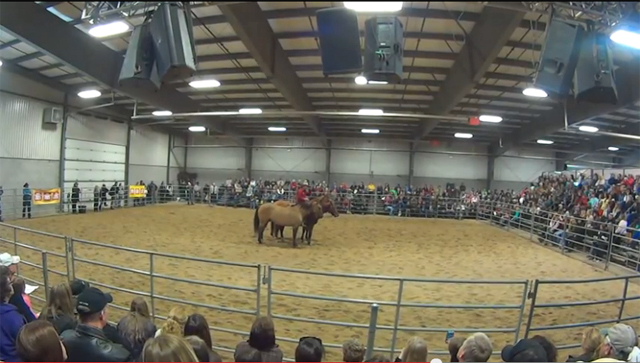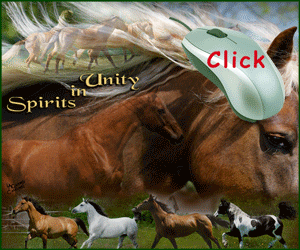
CFN – This Column of “Spirits in Unity” is being published by CFN for the community of Stormont, Dundas & Glengarry.
Today’s column is a compilation of thoughts inspired by various writings, talks and presentations of Horse Masters Pat and Linda Parelli as well as personal experiences with horses.
What Makes Your Horse Tick?
Any of us who have had the joy of raising more than one child have probably wondered at how different the personalities of the individual children develop. Even in the case of twins, of which I am lucky to be the grandfather of two sets of twins, the personalities develop their own characteristics and you soon realize that you have to treat them differently if you are going to succeed to build a good rapport with them.
So it is with horses. Many people simply study the general characteristics of horses and how they behave and leave it there. But if you want to gain a higher level of rapport with your horse you have no choice but to try to understand his particular personality traits. If you know what he likes or values, it will be much easier to build rapport and a true connection with that particular horse. Some people are naturally better at sensing what individual horses really want from them, but most of us often find it more challenging especially when we have the opposite personality of our horses.
The body of work that I most refer to when trying to understand my horse’s personality is that done by Linda Parelli which she based on the observations and experiences of her husband Pat Parelli in dealing with thousands of horses over a considerable period of time. They have trade marked their work with the term “Horsenality”. I strongly recommend anyone who wants to develop a closer relationship with horses to look into their work. You may even discover that you become better at understanding your own personality and how you tick as well.
I will try to relate in this column some of the things I have learned about individual horse personalities and how to relate better to them.
Horse personalities can be divided into two categories:
1. Extroverted-Introverted
2. Left Brain and Right Brain
Extroverted behaviour means more movement and higher energy level while introverted behaviour means less movement and lower energy.
If your horse could talk to you what would he/she say?
Left-Brain Extroverts
These horses might say to you “Play with me. Come on. Play. Give me something interesting to do. Use my energy. Let’s have fun.
Or else… I’ll just have fun at your expense. How about a little buck? Or maybe a little nip. Or how about I just drag you over to where I’d rather be.”
For this type of horse personality undemanding time does not build rapport with him. Instead it is play time that builds stronger rapport. It is important to understand his ideas and to encourage them instead of trying to channel his energy or trying to shut him down. Saying no, no, no to this type of horse will usually bring you an argument and he is very good at it. Does this remind you of any humans you know? Interesting Eh?
In the following video can you pick out the introvert and the extrovert?
Right Brain Extrovert
This horse says, “Focus Me Please! Give me leadership. Give me a task to focus on so I don’t have to be so consumed by my own fears. Interrupt my pattern of behaviour and calm me down. Oh my the sky is falling, I do get confused, scattered and scared easily so I really need to know that you are my protector and someone I can trust to clearly tell me what to do without punishing me or trying to hold me back.”
The following video is a good example of what not to do with the Right Brain Extrovert. These are the type of horses that some trainers use a lot of force to get them under control, but that only creates a more dangerous horse. These are the ones that can really hurt you. Next time I will try to show you some horses like this after the proper treatment. For now enjoy this video:
For this type of horse personality, non-demanding time and focused leader styles are a great way to build rapport. You need to use both.
Left-Brain Introvert
This horse says, “What’s in it for me? What’s my motivation for doing what you want me to do. Give me a good reason why I should do that for you. If we only just met, a treat would be a nice introduction. But if you are a real horseman you will learn how to capture my interest by being even more interesting than food. Or else, I will just go over there and eat that nice patch of grass and fight you for the right to do so. Oh, and don’t rush me. Ask me a question, give me a problem to solve, but be patient and give me time to work it out. I may look it but I not just being lazy, I’m thinking.”
For these horses, non-demanding is very valuable, especially if there is grazing involved. The way to this man’s heart (or woman’s) is through his stomach. Sounds a bit like a lot of human fella’s I know. The way to this horse’s heart is also through his mind. Slow down and make things interesting with lots of variety.
In the following video clip watch for this left brain introvert and how he asks for his food reward for complying with his owner’s request. Notice how slowly he responds. These horses may look dull and slow but they are thinkers and need time to respond.
Right-Brain Introvert
This horse would say to you, “Please be gentle with me. My feelings are very easily hurt. Can you not feel my fear and distrust? Or doesn’t that matter to you. Please slow down. Don’t push me. Back off and let me think. Be patient, this could take me awhile – but if you want me to trust you, you’ll just have to wait. I really mean it! If you wait long enough, I’ll probably do what you want, but don’t you dare rush me. You have been warned. Beneath this calm exterior is a raging tiger. Trust me on this.”
For this horse, non-demanding time and not hurrying is the best way to build a trust-bond relationship. You will know it is working when he starts to offer things and is not so reserved. For most people these horses are the most difficult because they try your patience to the limit. But if you push them past their limit, they will often explode and you’ll be left wondering “Where did that come from?”
The following video clip shows a good example of this type of horse. It looks at first like the girl is taking her time and the horse appears calm but in fact is holding her fear inside and when she can’t stand it any more reacts.
Match the energy, Mirror the Behaviour
We have already mentioned in a previous column about how humans match and mirror other humans in order to gain their trust and establish leadership. This is what it takes for other humans to accept us and it is the same for horses. When in horse Ville we must do as horses do as individuals.
When you think of energy as the first thing to try to match, it immediately causes you to become more extroverted or more introverted according to how the horse is behaving. When your energy level is different from the horse’s energy, you will break rapport or have a very hard to build rapport.
These are different way to express your energy and match the horse’s energy.
1. How quickly your mind is working.
2. How much mental or emotional energy/tension/excitement is coming out of you even if you are not moving your feet.
3. How you move yourself – your feet, arms, eyes, head, body.
We try to match the human’s personality with the horse’s as best we can here at Drogheda Manor Horsemanship at least in the beginning so as to give the human at least chance to succeed. I have seen instances of people who were introverted having terrible trouble with extroverted horses and others who have had a terrible time with an introverted horse just because they could not calm their thoughts.
An extroverted horse can feel the disharmony between you and him and a lack of rapport follows when their human partner is too slow for them. Learning how to feel your horse’s mental and emotional energy is more important that the physical, because it is the mind and emotions that interfere with the horse being able to move his feet. All the great master horsemen are able to do this very well. Developing a high level of self awareness is a skill that is hard to master, but your horse can probably help you out with that. Horses are extremely perceptive. They can read you like a book.
Energy Quiz – How well can you match your horse’s energy?
Physical Energy – are you:
– quicker
– slower
– The same
Mental energy – are you:
– ahead of your horse’s thoughts
– behind his thoughts and therefore surprised by your horse’s action
– just right
Emotional energy – are you:
– calm and able to control you “butterflies”
– nervous
– intense
– ambitious
– insensitive
– hyper-sensitive
– emotional (easily upset, frustrated, disappointed, angry, etc.)
Answer yes, no or sometimes to each question and evaluate yourself.
In our next and last column on Rapport we will deal more with the concept of Matching your horses mental, emotional and physical reactions.
For all those people who give horses loving homes, and for all those kids who are wishing for that special partner, may all your dreams and your horse’s dreams come true also.
Whether you are just a horse lover, have dreams of owning a horse someday, or already have one, I hope these columns will give you some insight into the true nature of these magnificent creatures. I hope you will find them both informative and inspirational.
Please click on ‘like’ if you enjoyed this column and make a comment as well. We look forward to your feedback and questions.
Be part of your horse’s dreams, not his nightmares.
Garry “Horsetalker” Meek


Great article Garry!
I appreciate the videos!!! I’m very “visual”, so this helps me to see characteristics of my own guys in these horses. Thank you!
You are welcome. Thanks for reading.
I really like the article Garry. Cant wait to see your next one!